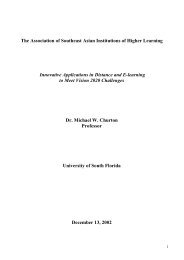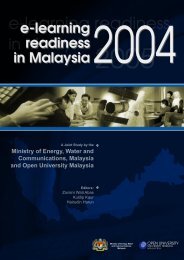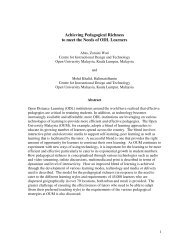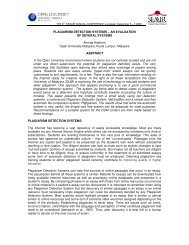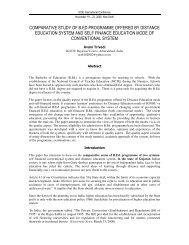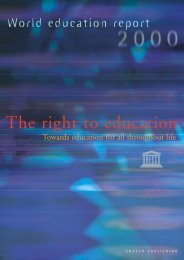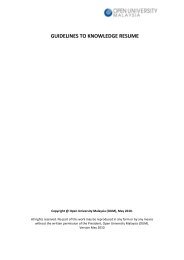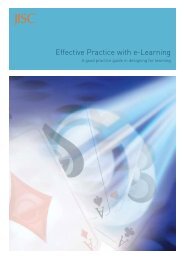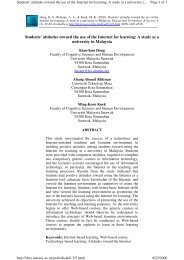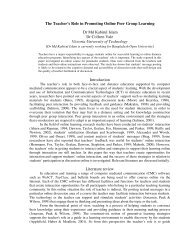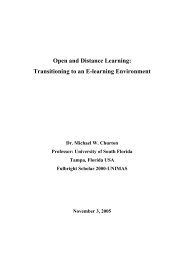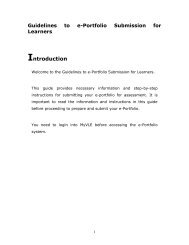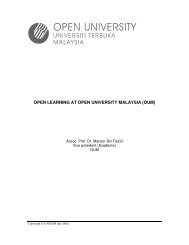lifelong learning and distance higher education - Asia Pacific Region
lifelong learning and distance higher education - Asia Pacific Region
lifelong learning and distance higher education - Asia Pacific Region
- No tags were found...
You also want an ePaper? Increase the reach of your titles
YUMPU automatically turns print PDFs into web optimized ePapers that Google loves.
INTRODUCTIONIn his 1996 report to UNESCO, Jacques Delors championed “Learning throughout life”as “the heartbeat of society […] one of the keys to meeting the challenges of the twentyfirstcentury.” (Delors, 1996). In the decade since then, intergovernmental organisationshave all taken notice of this issue, consulting experts, organising debates <strong>and</strong> seminars,gathering examples of good practice, <strong>and</strong> drafting reports addressed to the partiesconcerned, including political decision-makers.The European Commission declared 1996 as the Year of Lifelong Learning, <strong>and</strong> has sincethen continued to conduct surveys <strong>and</strong> studies. In 2000 it published a Communicationcontaining six “key messages” to facilitate the practical implementation of itsrecommendations. It completed all this with a first review in 2003. The OECD, whichpioneered this field in 1973 with the publication of a study entitled Recurrent Education:A Strategy for Lifelong Learning, continues to reflect on the best way, in terms of itsown purposes, of investing in “human capital”, to use a term that features in the OECD’sEducation Policy Analysis (1997). The Council of Europe, whose ideology is mainlyconcerned with the defence of human rights <strong>and</strong> equal opportunities, has conducted overfour years a programme of work on the subject of Lifelong Learning for Equity <strong>and</strong>Social Cohesion, which we have taken as the title for the present chapter (Council ofEurope, 2001).Such preoccupations of course reflect those of the member governments of theseorganisations. They are concerned about what they see as one of the major challenges ofour age <strong>and</strong> of our “knowledge society”, in which knowledge has become an economicissue, as well as a factor in combating exclusion, <strong>and</strong> one of the keys to a better qualityof life. Parliaments <strong>and</strong> educators have the task of finding ways to turn words into action<strong>and</strong> to give everyone who wants it the opportunity for self-<strong>education</strong> throughout life.The task is not an easy one: the situation is complex, as shown, indeed, by the evolutionof the terminology. Thus in addition to “continuous or ongoing training”, whichemphasise vocational training <strong>and</strong> the upgrading of employable skills, we now have“<strong>lifelong</strong> <strong>learning</strong>”, a much broader concept, when we recall the four objectives JacquesDelors assigned to <strong>education</strong>: <strong>learning</strong> to do, <strong>learning</strong> to be, <strong>learning</strong> to learn, <strong>and</strong><strong>learning</strong> to live together (Delors, 1996). As for the expression “<strong>lifelong</strong>”, it recalls LordBeveridge’s gr<strong>and</strong> design as he prepared the United Kingdom’s Welfare State at the endof the Second World War, proposing that it should look after its people from one end oftheir lives to the other, “from the cradle to the grave”.Today there is another change, as “<strong>education</strong>” gives way to “<strong>learning</strong>”, the formerindicating a process established (<strong>and</strong> therefore, perhaps, imposed) by society, the latterinvolving rather the voluntary acts of individuals who want to acquire knowledge at theirown pace <strong>and</strong> in their own way, for purposes of their own, which may not necessarilybe the same as their neighbour’s or those of the whole community. This is why we havechosen “Lifelong Learning for Equity <strong>and</strong> Social Cohesion” as the title for this chapter.We shall tackle the issue under three headings: “A new context”, “A new clientele”, <strong>and</strong>“A new challenge for <strong>higher</strong> <strong>education</strong>”.A NEW CONTEXTThe changing <strong>and</strong> proliferating meanings associated with ”<strong>lifelong</strong> <strong>learning</strong>” reflect thevarious facets of the problem, themselves connected with the manifold requirements of ourknowledge society. To emphasise one particular aspect or another will give this concept12



